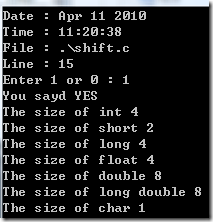C的小程序集合
1. The Hello World Program
/*世界上最流行的程序代码,hello.c*/
#include <stdio.h>
int main(void){
printf(“hello world !\n”);
}
2.计算2^n,注意排列的方式,左边是n的值从1到16,右边是2^n
#include <stdio.h>
#define N 16int main(void){
int n;
int val = 1;printf("\tn \t2^n\n");
printf("\t==========================\n");
for(n = 0 ; n < N ; n++){
printf("\t%d \t%d\n",n , val);
val = 2*val;
}
return 0 ;
}
3.利用printf来输出一个大G的形状
#include <stdio.h>
void blockg(void);
int main(void){
blockg();
return 0 ;
}void blockg(void){
printf("ggggggg\n");
printf("g g\n");
printf("g \n");
printf("g gggg\n");
printf("g g\n");
printf("ggggggg\n");
}
4.求和,输入两个整数,相加
#include "stdio.h"
int main(void){
int a, b;
while(scanf("%d%d", &a, &b)!=EOF)
printf("%d\n", a+b);
}
5.输入N个数,然后求和
#include <stdio.h>
int main(void){
int n , sum , lcv , current;
printf("please enter a positive number : ");
scanf("%d",&n);
sum = 0 ;
printf("please enter an integer:");
for(lcv = 0 ; lcv < n ; lcv++){
scanf("%d",¤t);
sum = sum + current;
}
printf("%d",sum);
return 0 ;
}
6.零钱硬币变美元
/* FILE: coins.c
* DETERMINES THE VALUE OF A COIN COLLECTION
* A Variation of the Hanly/Koffman book's example
*/#include <stdio.h>
void main ()
{
int pennies; // input: count of pennies
int nickels; // input: count of nickels
int dimes; // input: count of dimes
int quarters; // input: count of quarters
int temp, left; // temporaries for variousprintf("Enter the number of quarters, dimes, nickels, and pennies: ");
scanf("%d %d %d %d", &quarters, &dimes, &nickels, &pennies);left = 25 * quarters + 10 * dimes + 5 * nickels + pennies;
printf("Your collection is worth\n ");
temp = left / 100;
printf("\t%d dollar", temp);
if (temp==1)
printf(", ");
else
printf("s, ");
left = left % 100;temp = left / 25; //整除
printf("%d quarter", temp);
if (temp==1)
printf(", ");
else
printf("s, ");
left = left % 25; //取余数temp = left / 10;
printf("%d dime", temp);
printf ((temp==1) ? ", " : "s, ");
left = left % 10;temp = left / 5;
printf("%d nickel", temp);
if (temp==1)
printf(", and ");
else
printf("s, and "); //是否复数
left = left % 5;printf("%d penn", left);
if (left==1)
printf("y\n");
else
printf("ies\n");
}
7.真为1,假为0
#include <stdio.h>
int main(void){
printf("the value of 1<2 is %d\n" , (1<2));
printf("the value of 1>2 is %d\n" , (1>2));
return 0;
}
8.fibonacci.c
#include <stdio.h>
int main(void) {
int n; /* The number of fibonacci numbers we will print */
int i; /* The index of fibonacci number to be printed next */
int current; /* The value of the (i)th fibonacci number */
int next; /* The value of the (i+1)th fibonacci number */
int midval; /* The value of the (i+2)th fibonacci number */printf("How many Fibonacci numbers do you want to compute? ");
scanf("%d", &n);
if (n<=0)
printf("The number should be positive.\n");
else {
printf("\n\n\tI \t Fibonacci(I) \n\t=====================\n");
next = current = 1;
for (i=1; i<=n; i++) {
printf("\t%d \t %d\n", i, current);
midval = current+next;
current = next;
next = midval;
}
}
}
9.作用域
#include <stdio.h> int x = 2; int y = 3; int z = 4; void moo(int x, int *y){ int z; x = x+3; *y = *y+3; z = z+3; /*z在moo函数内部被重新的定义,所以z的值不能取变量z,但是在我们的日常编程的实践中,函数内部的变量名尽量不要和全局变量重合, 避免一些不必要的烦恼*/ printf("moo : x = %1d, *y = %1d, y = %1d, z = %1d\n", x,*y,y,z);//z = 3,int类型的初始值0 } int main(void){ moo(x, &y); printf("main: x = %1d1, y = %1d, z = %1d\n", x,y,z);//z为全局变量 }
10.最简单的数组操作
#include <stdio.h> int main(void) { int a[2] = {1,2};int b[2] = {2,3}; int i; for(i=0;i<2;i++) a[i]=b[i];if(a==b) printf("They are equal\n"); else printf("They are not equal\n"); //a和b不相等,要知道a,b之间的赋值只是指针的指向发生了变化,而不是a数组编程了b数组,质的变化是没有的。两个数组在内存中的位置是不一样的。虽然他们现在储存的指针式一样的,但是系统相互比较的是他们的位置而不是值 if(a==a) printf("Of course a is equal to a\n"); else printf("No, a is not equal to a\n");for(i=0;i<2;i++) printf("a[%1d] = %3d\n", i, a[i]); }
11.预处理变量和变量的长度
#include <stdio.h>
int main(void){
int answer;
short s = 1;
long l = 2;
float f = 3.0;
double d = 4.4;
long double ld = 5.55;
char c = 'p';
/*预处理器的威力*/
printf("Date : %s\n", __DATE__);//系统日期
printf("Time : %s\n", __TIME__);//系统时间
printf("File : %s\n", __FILE__);//文件名
printf("Line : %d\n", __LINE__);//表示此行的行数
printf("Enter 1 or 0 : ");
scanf("%d", &answer);/* 当你选择1时,为yes,0时,为no */
printf("%s\n", answer?"You sayd YES":"You said NO");/* 系统变量的长度 */
printf("The size of int %d\n", sizeof(answer));
printf("The size of short %d\n", sizeof(s));
printf("The size of long %d\n", sizeof(l));
printf("The size of float %d\n", sizeof(f));
printf("The size of double %d\n", sizeof(d));
printf("The size of long double %d\n", sizeof(ld));
printf("The size of char %d\n", sizeof(c));
}
12.变量,值,地址之间的关系
#include <stdio.h>
void moo(int a , int *b);
int main(void){
int x;
int *y;x = 1;
y = &x;printf("Address of x = %d, value of x = %d\n", &x, x);
printf("Address of y = %d, value of y = %d, value of *y = %d\n", &y, y, *y);//y中存储的地址是x的地址,*y可以访问到x的值。&y,y本身的地址
moo(9,y);
return 0;
}
void moo(int a ,int *b){
printf("Address of a = %d, value of a = %d\n", &a, a);
printf("Address of b = %d, value of b = %d, value of *b = %d\n", &b, b, *b);//&b本身的地址
}/* 输出来的结果:Address of x = 536869640, value of x = 1
Address of y = 536869632, value of y = 536869640, value of *y = 1
Address of a = 536869608, value of a = 9
Address of b = 536869600, value of b = 536869640, value of *b = 1
*/
13.利用int值和%c来显示acsii码
#include <stdio.h>
int main(void){
int c ;
for(c = 32 ; c < 127 ; c++){
printf("\t %c %d\n", c, c);
}
return 0;
}
14.求你输入的字符串的长度和内容
#include <stdio.h>
#define BUFFER 128
int getLine(char line[], int nmax);
int main(void){
int len;
char buffer[BUFFER];while(1){
len = getLine(buffer,BUFFER );
if(len ==0){break;}
printf("len = %d,line = %s\n",len,buffer);
}
}int getLine(char line[], int nmax){
int len;
char c;len =0;
printf("Enter a string [CR to exit]:");
while((c = getchar()) !='\n'&& len < nmax-1){
line[len++] = c;
}
line[len] = '\0';
return len;
};
15.思考一个问题
#include <stdio.h>
#define NPRIMES 1000
#define FALSE 0
#define TRUE 1int main(void){
int n ;
int i;
int primes[NPRIMES];printf("请你输入N值:\n");
scanf("%d",&n);
for(i = 0 ; i < n;i++){
primes[i] = i++;//两段代码的唯一区别
printf("%d\n",primes[i]);
}
return 0;
}
#include <stdio.h>
#define NPRIMES 1000
#define FALSE 0
#define TRUE 1int main(void){
int n ;
int i;
int primes[NPRIMES];printf("请你输入N值:\n");
scanf("%d",&n);
for(i = 0 ; i < n;i++){
primes[i] = i;
printf("%d\n",primes[i]);
}
return 0;
}以上两段代码执行的结果一样吗??
结果是不一样的,下面这个是可以正常的打出我们希望的值,但是上面只打出一堆未被赋值的初始值,原因出在i++身上,用debug跟踪,发现i++的赋值正好是隔行赋值,跳着赋值,但是printf是慢了一个节拍,显示是未被赋值的数组元素。




